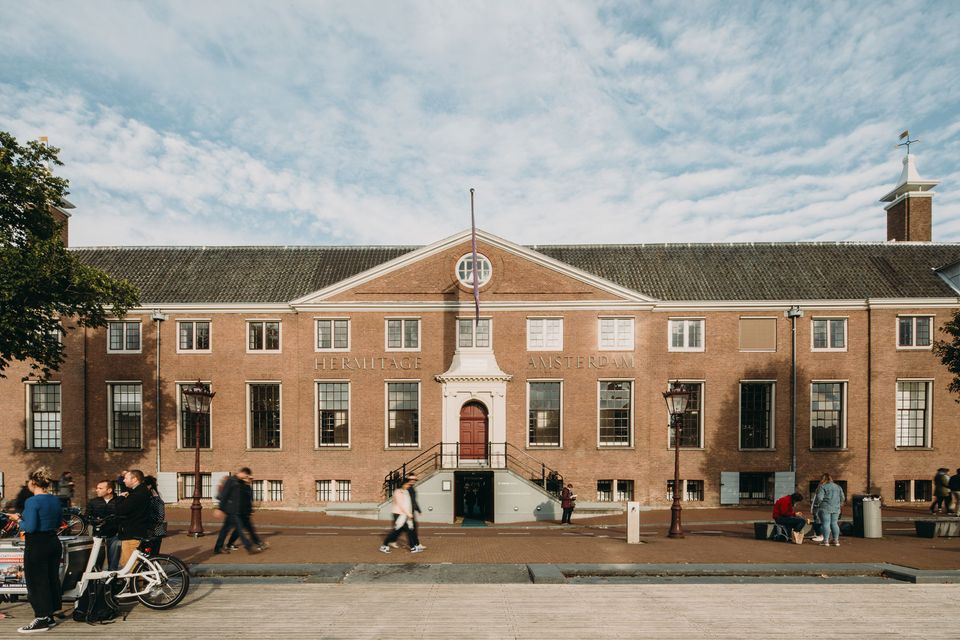
Faced with a “dramatic” deficit after being closed for six months by stop-start pandemic restrictions, the Hermitage Amsterdam launched an unprecedented crowdfunding appeal on 25 March: “Keep the Hermitage Open”. The museum, an independent offshoot of the State Hermitage Museum in St Petersburg, is now close to reaching its ambitious €1m target after racking up more than 10,000 public donations in seven weeks.
“10,000—and counting,” says the museum’s director, Annabelle Birnie, who took up her post at a critical juncture in January, two months after her predecessor was forced to let go of a quarter of the permanent staff (11 employees). The fundraising campaign remains open to donations. “We’re not done yet.”
Though the Amsterdam museum shares the brand-name of Russia’s prestigious and state-funded Hermitage, it has always been an “entrepreneurial” organisation, Birnie says. The managing foundation, Stichting Hermitage aan de Amstel, receives no structural subsidies from either local or central government in the Netherlands.
Nor can it seek help from its St Petersburg parent (which itself announced a significant shortfall due to Covid-19 last year). Conceived by the Hermitage’s director Mikhail Piotrovsky and the museum’s Dutch friends association, the Hermitage Amsterdam opened in 2004 as a branch for changing exhibitions drawn from the more than three million artefacts in the Russian institution’s collection. The renewable co-operation involves “a financial stream going from Amsterdam to St Petersburg and not the other way round”, Birnie says.
Before the pandemic hit, the Dutch museum relied on ticketing income from visitors—an average of 400,000 a year, most from the Netherlands and other European countries—to make up 70% of its budget. The remaining 30% came from “other means like sponsorships or project funds” but “they were all more or less dependent on visitors”.
By March, a year since the Dutch government first ordered museums nationwide to close, the Hermitage Amsterdam was struggling to offset the “huge” financial impact of the pandemic. Despite cutting costs for exhibitions and infrastructure to “a minimum”, the director says: “we could see the end of our reserves coming”. The museum has applied for emergency grants from the government and the city of Amsterdam, she adds, but the process may take “a month or more” to conclude, with no guarantee of success.
“We could not have made it without the crowdfunding [appeal],” Birnie thinks. The museum initially hoped to find wealthier donors willing to give €2,500 each, but media attention and “posters all around the Netherlands” quickly helped to attract smaller gifts of €10 to €100. The 10,000 donations logged so far—including a few gifts in kind—are an “amazing” result in a country without a “big giving culture”, Birnie says. “We are happy to reach our goal.”
“All the proceeds” will go towards sustaining the future exhibition programme, starting with a show on the Russian avant-garde, including works by Malevich, Tatlin and Kandinsky, that is scheduled to open in January 2022. Though Birnie anticipates the museum will have to operate with a reduced budget and staff until summer 2023, its finances are now secure enough to enable preparations for a Matisse-Picasso exhibition in 2023-24. Thanks to the crowdfunding campaign, “we have a faraway horizon,” she says.
The Hermitage Amsterdam remains closed under Dutch government guidelines and Birnie is apprehensive about a forthcoming law that could make it mandatory for museum visitors to show a negative coronavirus test result before gaining admission. While the exact terms of the test certificate law are still under debate by the Dutch parliament, the reopening date for the country’s museums is “forecast to be between 1 June and 1 July”, Birnie says. “The sooner the better because we need every visitor.”